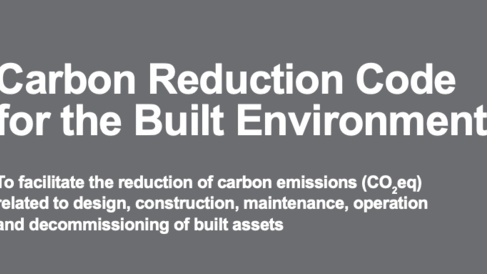
Morgan Sindall Construction and public sector procurement authority SCAPE have achieved CHAMPION level of the Carbon Reduction Code for the Built Environment, joining HS2 (the project) and Skanska UK in this highest category level.
The Code, which is a commitment scheme designed to facilitate action and collaboration in the built environment towards reducing carbon emissions (CO2eq) related to design, construction, maintenance, operation and decommissioning of built assets, forms part of the Construction Leadership Council’s Construct Zero initiative.
The Code is structured around commitments that stimulate action in different aspects of carbon reduction. All organisations who comply to the Code must set out and publish plans to meet Net Zero by 2045, including annual targets, recognising that the majority of cuts need to be made by 2030, and publish progress against it annually. This is the minimum commitment for achieving PLEDGER status. There are three levels of compliance to the Code, PLEDGER, SIGNATORY, and CHAMPION. To comply with the criteria required to achieve CHAMPION level, an organisation must sign up to all of the Further Commitments of the Code in addition to the core commitments.
We are delighted to have been recognised as a Champion according to the Carbon Reduction Code, which raises the bar for organisational carbon management standards. Pat Boyle, Managing Director of Morgan Sindall Construction
“We are delighted that Morgan Sindall Constructionand SCAPE have achieved CHAMPON level of the Code. They join fellow CHAMPION organisations HS2 and Skanska UK, and PLEDGER level organisations – the National Association of Construction Frameworks (NACF), City Building Engineering Services (CBES), Interclass and SCF Construct,” said Dr Jennifer Schooling OBE, Director of CSIC which hosts the Code. “There are already a number of additional organisations in the Code pipeline which is promising because carbon reduction is more likely to happen when all organisations within a value chain are committed to reducing their footprint and saving costs. The Code provides a framework for organisations to make a public commitment to and report on progress towards achieving Net Zero.”
Pat Boyle, Managing Director of Morgan Sindall Construction said: “We are delighted to have been recognised as a Champion according to the Carbon Reduction Code, which raises the bar for organisational carbon management standards. Our commitment to be a Champion of the Code highlights the relevance of our Decarbonising Communities approach and underlines our ongoing efforts to work openly and collaboratively with stakeholders across the value chain to deeply decarbonise our own operations and the assets we deliver for our customers.”
Mark Robinson, Chief Executive of SCAPE said: “Addressing the climate emergency with practical action is a national imperative, and it is one we take very seriously at SCAPE. The Carbon Reduction Code is a hugely important initiative, and so I am absolutely thrilled that our team has achieved Champion status.
“The Code is vital to driving the systemic and behavioural change needed within construction and will serve as a barometer against our ambitious plans to enable a direct response to the climate challenge through procurement, design and delivery innovation. With the support of our passionate delivery partners, our talented teams and the robust governance that has been laid out in the Carbon Reduction Code, we are committed to working hand in glove with industry to chart a course that will improve the environmental performance of the public estate.”
Note to Editors
The Carbon Reduction Code for the Built Environment is designed for clients, contractors, and supply chain members working in the built environment. In order to enable wide participation, organisations may join at a global, national or regional level as well as at a major project level. While the Code’s reporting mechanism provides a point of difference, it is designed to work alongside a number of excellent existing initiatives and resources including the ICE Carbon Project, Construction Innovation Hub Value Toolkit, Infrastructure Carbon Review Seven Years On report, PAS2080, Science Based Targets Initiative (SBTi) and Built Environment Carbon Database (BECD).
Quick links
Read about the development of theCarbon Reduction Code for the Built Environment and watch a short video of the launch event for the Code here
Read about the launch of the sign-up process to the Code here
Read an explanation and guide to completing the compliance process and the sign-up form here
Read about Morgan Sindall Construction’s Decarbonising Communities initiative
Read about Net Zero by SCAPE here
